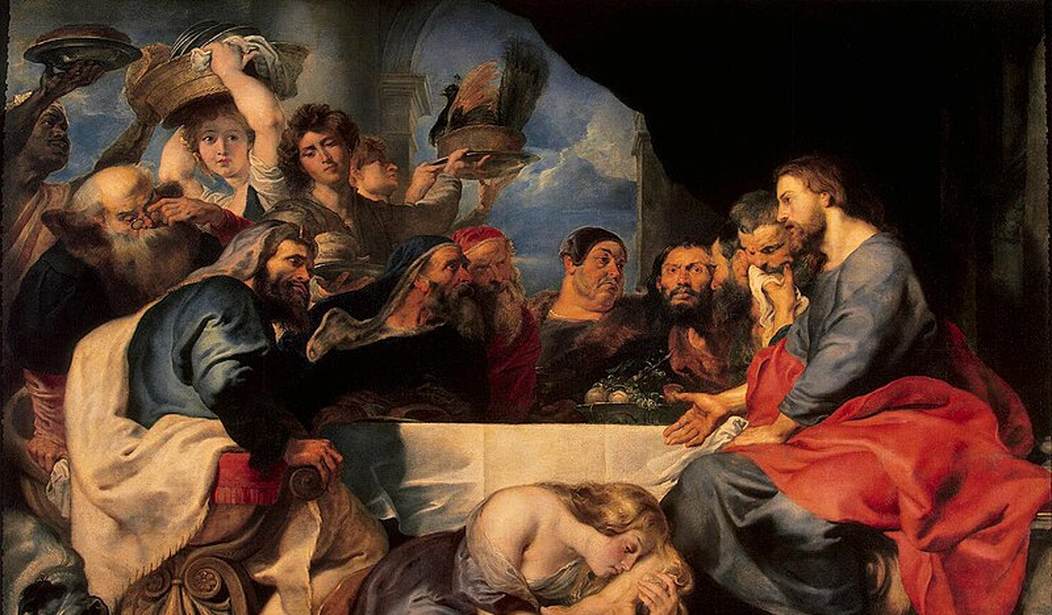This morning’s Gospel reading is Luke 18:9–14:
Jesus addressed this parable to those who were convinced of their own righteousness and despised everyone else. “Two people went up to the temple area to pray; one was a Pharisee and the other was a tax collector. The Pharisee took up his position and spoke this prayer to himself, ‘O God, I thank you that I am not like the rest of humanity — greedy, dishonest, adulterous — or even like this tax collector. I fast twice a week, and I pay tithes on my whole income.’ But the tax collector stood off at a distance and would not even raise his eyes to heaven but beat his breast and prayed, ‘O God, be merciful to me a sinner.’ I tell you, the latter went home justified, not the former; for whoever exalts himself will be humbled, and the one who humbles himself will be exalted.”
A friend of mine reached out to me last week and asked about the Catholic perspective on the need for confession through a priest. I offered the biblical foundation for it (John 20:21-3), and she thanked me for it, but we haven't circled back for a longer discussion. Although today's Gospel doesn't touch directly on her respectful and authentic query, it does offer at least light on the need for formal repentance and atonement, and the church's role in mediating it.
In this Gospel reading today, we have two men come to the temple to worship the Lord. One comes in righteousness, while the other in abject misery at his own poverty of spirit. In Jesus' parable, He intends to teach that poverty of spirit as a model for true worship -- and for the need to confess it honestly. But there is a deeper lesson here in terms of coming to grips with our own identities and the nature of sin, and why that matters in worship of the Lord.
Let's start with the Pharisee, a station of high respect at the time in temple culture. He offers what might be considered praise, but who is the Pharisee praising? He is thanking the Lord for blessing him, which would normally be considered a righteous act. We should always praise the Lord for our blessings, thanking him for His love and protection. However, the Pharisee isn't truly praising the Lord; he is praising himself, and essentially judging himself worthy by comparison to others. The Pharisee assumes in his prayer that the Lord grades on a curve, and judges based on the values of men rather than His own.
Jesus then offers the prayer of the tax collector, the lowest of all stations in temple society. In later eras, we would call these men collaborators, and in the specific case of Roman tax collection policies, thieves. They robbed their own people to enrich their occupiers, the same people who oppressed them and kept them from full worship and freedom. The Judeans had become a subjugated people to pagans, and the tax collectors greased the wheels of the systems that victimized their people.
The tax collector offers nearly the exact opposite of the Pharisee's approach to the temple. Instead of arrogance, the tax collector comes in abject misery about his relationship with the Lord. He was so ashamed of his status as a sinner that he could not even lift up his eyes while approaching. Rather than offer excuses or justifications by comparing himself to those worse around him, the tax collector admitted his sinfulness in honest sorrow, and asked for mercy.
Jesus cleverly crafts this parable through the use of these extremes. His disciples may not have been fond of Pharisees, but the tax collectors would earn a special revulsion, perhaps much worse than Jesus' similar use of the Samaritan in his parable about the nature of "neighbors." Jesus then tells the disciples that it's the tax collector and not the Pharisee who left the temple cleansed of sin.
But why? The main point is the Pharisee's arrogance blinds him to his own sinfulness. The tax collector's humility allows him to fully understand his relationship to the Lord. The Pharisee came to the temple to praise himself; the tax collector came to humble himself. Which of these actually worshiped the Father as Lord? Which man put himself in the proper relationship with God while in the temple? This is not a parable about personality types; it is a lesson in grasping that no one is worthy to come to the temple and praise himself, and that all must account of their sins. The Lord does not grade on the curve, in other words.
However, there is another aspect to this as well, which brings us back to my friend's sincere question. What Jesus offers in this parable is not just the model for atonement at the temple, but also the model for forgiveness of sins. Let's recall John 20:21-3:
21 Again Jesus said, “Peace be with you! As the Father has sent me, I am sending you.” 22 And with that he breathed on them and said, “Receive the Holy Spirit. 23 If you forgive anyone’s sins, their sins are forgiven; if you do not forgive them, they are not forgiven.”
Before Christ, the Jews came to the temple to offer sacrifices in atonement for sins. After the Resurrection, Christ transformed the path of salvation in establishing a missionary church that would replace the fixed temple, making "disciples of all nations" through the evangelization of the Gospel that promised the forgiveness of sin through Himself. He passed that authority to the episcopate of His church through the Holy Spirit so that repentance, atonement, and forgiveness would be facilitated wherever the church was established.
In today's parable, Jesus offers a model for that process. Two men come to the church, one of whom refuses to acknowledge his own sinfulness and leaves unjustified. The other comes, beating his breast in shame and repentance, bringing his sin to the temple/church in full and asking for mercy. It is the latter who leaves reconciled, because he came to the temple/church to formally offer his repentance and atonement, and who receives mercy through that overt act.
Why would it take the overt act, though? We also receive the Holy Spirit when we are baptized and confirmed into the church, and we are also told that we are all called to be "priests, prophets, and kings" in a sense regardless of ordination. However, that status is what we gain through surrendering our lives to Christ and allowing Him to live through us. In John 20, Jesus specifically ordains the apostles to exercise His specific authority to forgive sin through the church.
And why is that? Because we are not resistant enough to sin on our own to exercise self-judgment. Jesus uses the Pharisee in this parable to make that point. The Pharisee is a learned man in the scriptures, devoting himself to the temple and the Law. Yet that authority has gone to his head; as a member of the temple authority, he has lost any ability to maintain a healthy perspective on his own sinfulness and arrogance. He is the example of the dangers of "self-forgiveness," so to speak. We lose sight of sin without accountability, and then become inclined to let ourselves off the hook for it by grading ourselves on a curve. By doing so, we commit the sin of judging others. Even priests and bishops have to go to confession; the Pope has his own confessors for that reason as well.
Jesus leaves us the Church for our own ability to repent, atone, and be forgiven. The Church is the path to salvation for that forgiveness and reconciliation, and exists to remind us that sin is not left to our judgment but to the Lord's. There is no curve on which to grade; we all sin and fall short of His Glory, and the only way to reconcile that is through true repentance and atonement.
Previous reflections on these readings:
- Humility, Mac Davis, and doing the best that we can: Sunday reflection (2022)
- Playing catch-up to a Sunday reflection (2019)
- Sunday reflection: Luke 18:9–14 (2016)
The front page image is "Feast of Simon the Pharisee” by Peter Paul Rubens, c. 1620. On display at the Hermitage Museum. Via Wikimedia Commons.
“Sunday Reflection” is a regular feature that looks at the specific readings used in today’s Mass in Catholic parishes around the world. The reflection represents only my own point of view, intended to help prepare myself for the Lord’s day and perhaps spark a meaningful discussion. Previous Sunday Reflections from the main page can be found here.
Join Hot Air VIP, VIP Gold, or VIP Platinum, and use promo code POTUS47 to get 74% off your membership!








Join the conversation as a VIP Member